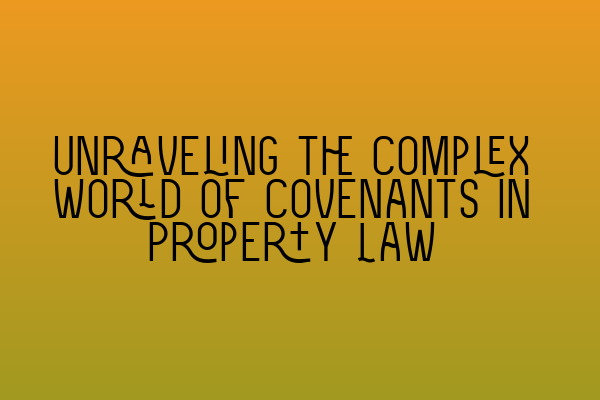Unraveling the Complex World of Covenants in Property Law
Property law is a vast and intricate field that involves various legal concepts and principles. One such concept that often perplexes individuals is “covenants.” Covenants are an essential aspect of property law as they govern the rights and obligations associated with land ownership. In this blog post, we will unravel the complex world of covenants and help you understand their significance in property law.
What Are Covenants?
Covenants are legal obligations or restrictions that are placed on a property by its owner or by a previous owner. These obligations or restrictions are documented in a legal document known as a “deed” or a “covenant agreement.” They are binding on the current and future owners of the property and can have significant implications for land use and development.
There are two main types of covenants: affirmative covenants and negative covenants. Affirmative covenants require the property owner to perform specific actions, such as maintaining the property or paying certain fees. On the other hand, negative covenants restrict the property owner from engaging in certain activities or behaviors, such as constructing a fence or operating a business on the premises.
Enforceability of Covenants
The enforceability of covenants depends on various factors, including their nature, wording, and compliance with applicable laws. Covenants can be enforceable against all subsequent owners of the property, known as “covenant running with the land.” This means that even if a property is sold, the new owner will still be bound by the covenants.
However, the enforceability of covenants can also be subject to time limitations. Some covenants may have expiration dates, while others may be perpetual and continue to be enforceable indefinitely. It is crucial to review the specific language of the covenant agreement and consult with a property law solicitor to understand the extent of its enforceability.
Common Types of Covenants
There are several common types of covenants that you may come across in property law. These include:
- Restrictive Covenants: These covenants limit the use of the property and often impose aesthetic or architectural guidelines to maintain the overall character of an area. They are common in residential communities and may specify restrictions on property alterations or use.
- Positive Covenants: Positive covenants require the property owner to perform certain actions, such as maintaining shared amenities or contributing to the maintenance costs of a communal area.
- Rights of Way: These covenants grant individuals or entities the right to pass over a specific property to access another property or public thoroughfare. Rights of way are crucial in ensuring access and maintaining transport links.
- Leasehold Covenants: Leasehold covenants are specific to leasehold properties and outline the rights and obligations of the tenant and the landlord. These covenants often cover rent payments, repairs, alterations, and use of the property.
Understanding these common types of covenants is essential, as they can significantly impact your rights and responsibilities as a property owner.
Challenging Covenants
In some instances, you may want to challenge the enforceability or validity of a covenant. Challenging covenants can be complex and require a thorough understanding of property law. If you believe that a covenant is unfair, unreasonable, or no longer serves a valid purpose, you may seek legal advice to explore potential options for challenging the covenant.
It is important to note that challenging covenants can be a contentious legal process, and the outcome will depend on various legal factors. Consulting with an experienced property law solicitor is crucial in navigating this complex territory and increasing the chances of a favorable resolution.
Seek Professional Advice
If you are involved in a property transaction or facing issues related to covenants, it is highly recommended to seek professional advice from a qualified property law solicitor. A solicitor specializing in property law will have the expertise and knowledge to navigate the complexities of covenants and guide you through the legal process.
At SQE Property Law & Land Law, we have a team of expert solicitors who specialize in property law and can provide the assistance you need. Our solicitors offer comprehensive legal services tailored to your specific needs, ensuring that you are well-informed and protected throughout the process.
To further prepare for your SQE exams or gain more in-depth knowledge about property law, you can also explore our related articles:
- SQE 1 Practice Exam Questions
- SQE 1 Practice Mocks FLK1 FLK2
- SQE 2 Preparation Courses
- SQE 1 Preparation Courses
- SRA SQE Exam Dates
Remember, property law can be complex, but with the right guidance and knowledge, you can navigate through it smoothly. Contact SQE Property Law & Land Law today to get the professional advice you need!
